10 EHR Vendors Transforming Healthcare Data Management

10 EHR Vendors Transforming Healthcare Data Management
Overview
The article titled "10 EHR Vendors Transforming Healthcare Data Management" delves into how various electronic health record (EHR) vendors are reshaping the landscape of healthcare data management. Vendors like Epic, Cerner, and athenahealth are at the forefront of this transformation, utilizing advanced analytics and interoperability to enhance patient care and operational efficiency.
Features: These vendors offer user-friendly solutions that streamline data management processes.
Advantages: By integrating sophisticated analytics, they enable healthcare providers to make informed decisions quickly.
Benefits: Ultimately, this leads to improved patient outcomes and a more efficient healthcare system, addressing the increasing demand for effective data management solutions.
How can these advancements in EHR technology impact your practice? Consider the potential for enhanced patient engagement and operational workflows.
In conclusion, as healthcare continues to evolve, the role of EHR vendors becomes increasingly critical. Their innovative approaches not only meet current demands but also pave the way for future advancements in healthcare data management.
Introduction
As the healthcare landscape evolves into a data-driven environment, the role of Electronic Health Record (EHR) vendors becomes crucial in shaping effective data management strategies. With numerous options available, organizations can leverage innovative solutions that not only enhance patient care but also improve operational efficiency. However, the real challenge is determining which EHR systems genuinely transform healthcare delivery and cater to the unique needs of various practices.
This article delves into ten leading EHR vendors that are at the forefront of revolutionizing healthcare data management. By examining their distinct features, we can uncover the advantages they offer and the tangible benefits they provide for both healthcare providers and patients. How can these systems impact your practice? Let’s explore the insights that can guide your decision-making in this critical area.
Initial Data Offering: A Platform for Discovering Quality Datasets
Initial Data Offering (IDO) is a platform designed to streamline the launch and discovery of new datasets, particularly in the medical field. By curating high-quality and distinctive datasets, IDO addresses the fragmented nature of the information marketplace, serving businesses, researchers, and organizations globally. This accessibility is crucial, as enhanced information availability can lead to better patient outcomes and advancements in healthcare practices. Notably, statistics reveal that 62% of surveyed clients utilized alternative information last year, highlighting the increasing demand for diverse datasets.
The platform's commitment to quality and community involvement empowers users to leverage information effectively for informed decision-making. As medical services continue to evolve, the importance of accessible and reliable information cannot be overstated. Experts stress that overcoming barriers to information accessibility is essential for maximizing the potential of medical data, which remains a significant challenge in the industry. Successful examples, such as Syndesis Health's collaborations to improve real-world information access, demonstrate the positive impact that enhanced sharing can have on healthcare outcomes.
Looking ahead to 2025, trends suggest a sustained emphasis on marketplace solutions that prioritize accessibility and quality. As the digital health landscape expands, platforms like IDO are poised to play a pivotal role in connecting information providers with users. This connection will ultimately foster innovation and strategic planning across various sectors. How can your organization leverage these datasets to improve outcomes? The potential is vast, and the time to act is now.
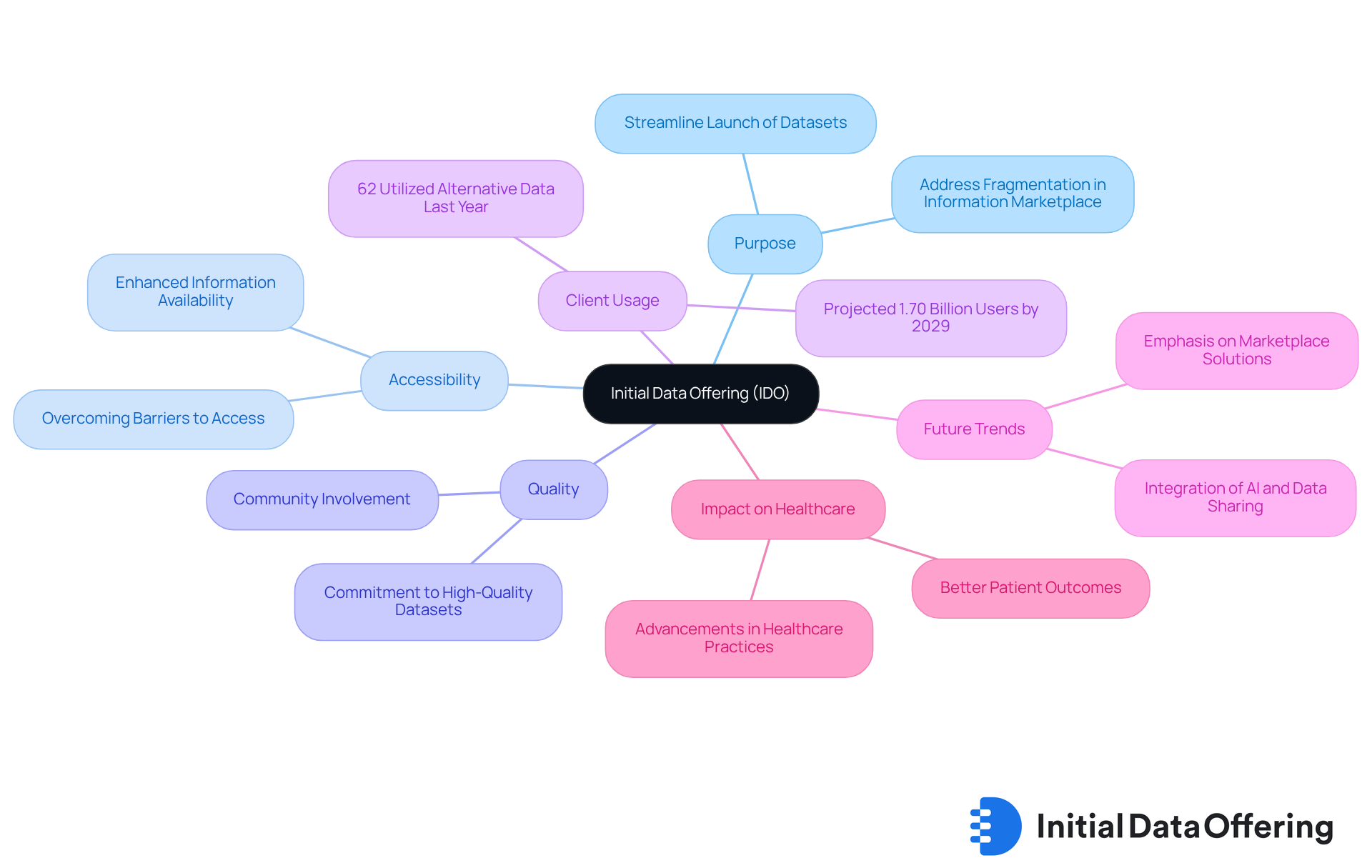
Epic EHR: Comprehensive Solutions for Healthcare Management
Epic is recognized among EHR vendors as a leader in medical information management, known for its comprehensive solutions that significantly enhance outcomes for patients. With a commanding market share of 41.3% in the U.S. hospital EHR sector, Epic Systems Corporation leads among EHR vendors by integrating clinical, administrative, and financial information into a unified platform. This integration is vital for improving service coordination and operational efficiency, allowing providers to access and analyze patient information seamlessly.
The platform's advanced analytics capabilities empower medical organizations to derive actionable insights from their data, leading to improved decision-making and treatment outcomes. For instance, studies have shown that EHR systems like Epic can boost preventive care compliance and reduce hospital readmissions. How might these improvements impact your organization’s approach to patient care?
Moreover, the interoperability features of Epic enable EHR vendors to facilitate the transfer of patient information across diverse medical settings, which is essential for comprehensive patient management. This capability not only fosters better clinical outcomes but also complies with regulatory requirements, such as the HITECH Act, which aims to enhance data sharing in healthcare.
Real-world examples underscore Epic's effectiveness; hospitals utilizing its EHR have reported notable improvements in care quality and patient satisfaction. As healthcare continues to evolve, Epic's commitment to innovation and data-driven insights positions it as a key player in transforming health management and enhancing patient outcomes. What steps can your organization take to leverage such technology for better healthcare delivery?
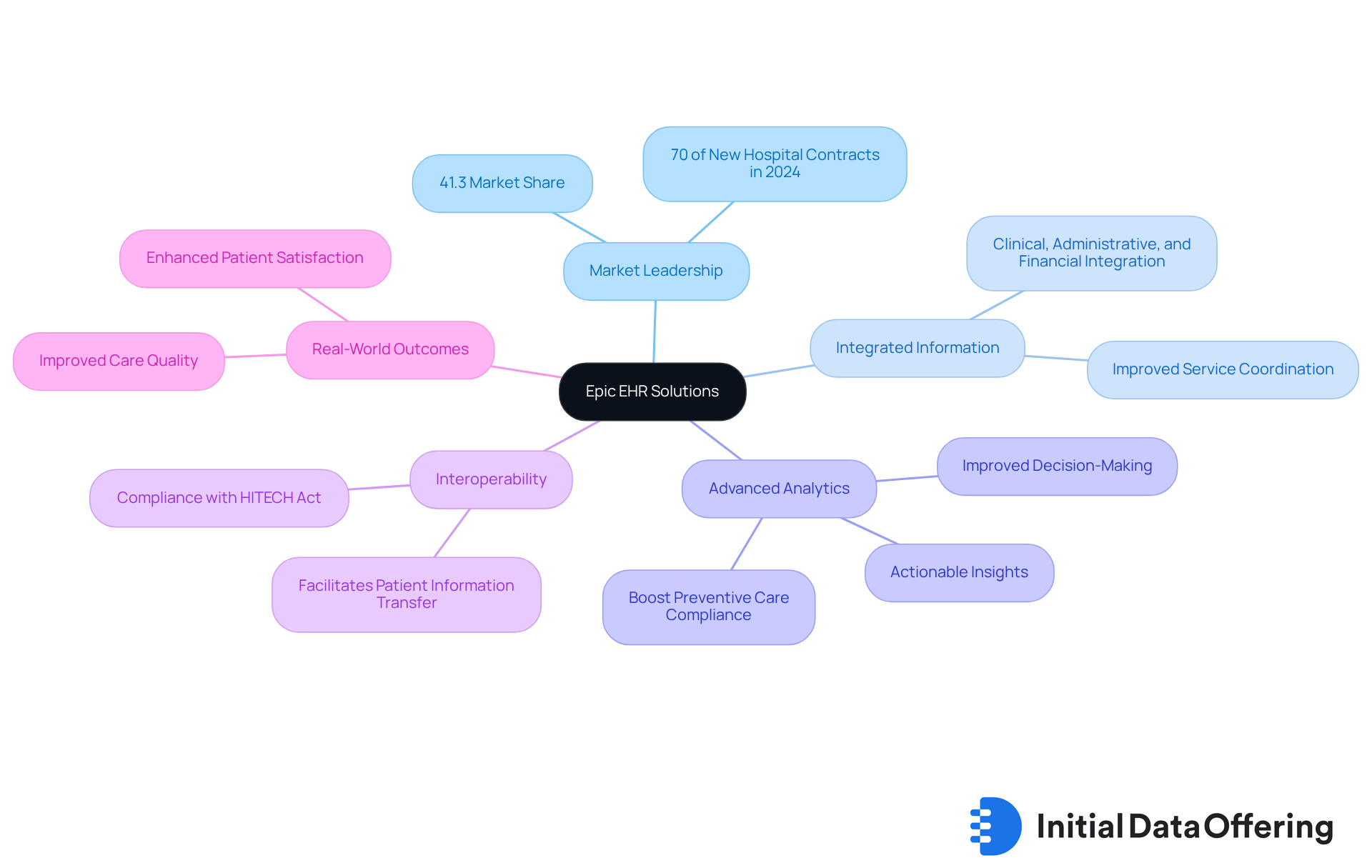
Praxis EMR: Customizable Solutions for Unique Practice Needs
Praxis EMR offers a unique, customizable platform that allows medical providers to tailor their electronic health records to meet specific practice needs. This template-free design empowers users to create workflows that align seamlessly with their clinical processes. As a result, it enhances efficiency and reduces the burden of documentation.
Why is this flexibility important? Praxis EMR, supported by ehr vendors, becomes an ideal choice for diverse medical environments, enabling providers to focus on delivering high-quality care without the constraints of rigid systems. As of 2019, approximately 90% of office-based physicians were utilizing an EHR, underscoring the critical need for customization in today’s healthcare landscape.
Moreover, a study published in JAMA revealed that 'poor usability of ehr vendors is the number one complaint of most medical professionals.' This finding highlights the necessity for adaptable solutions from ehr vendors like Praxis EMR. For instance, the real-time information integration project at Mount Sinai Tisch Cancer Center exemplifies how customizable EHR systems can improve individual treatment and operational efficiency. Such examples showcase the tangible benefits of flexible solutions in enhancing healthcare delivery.
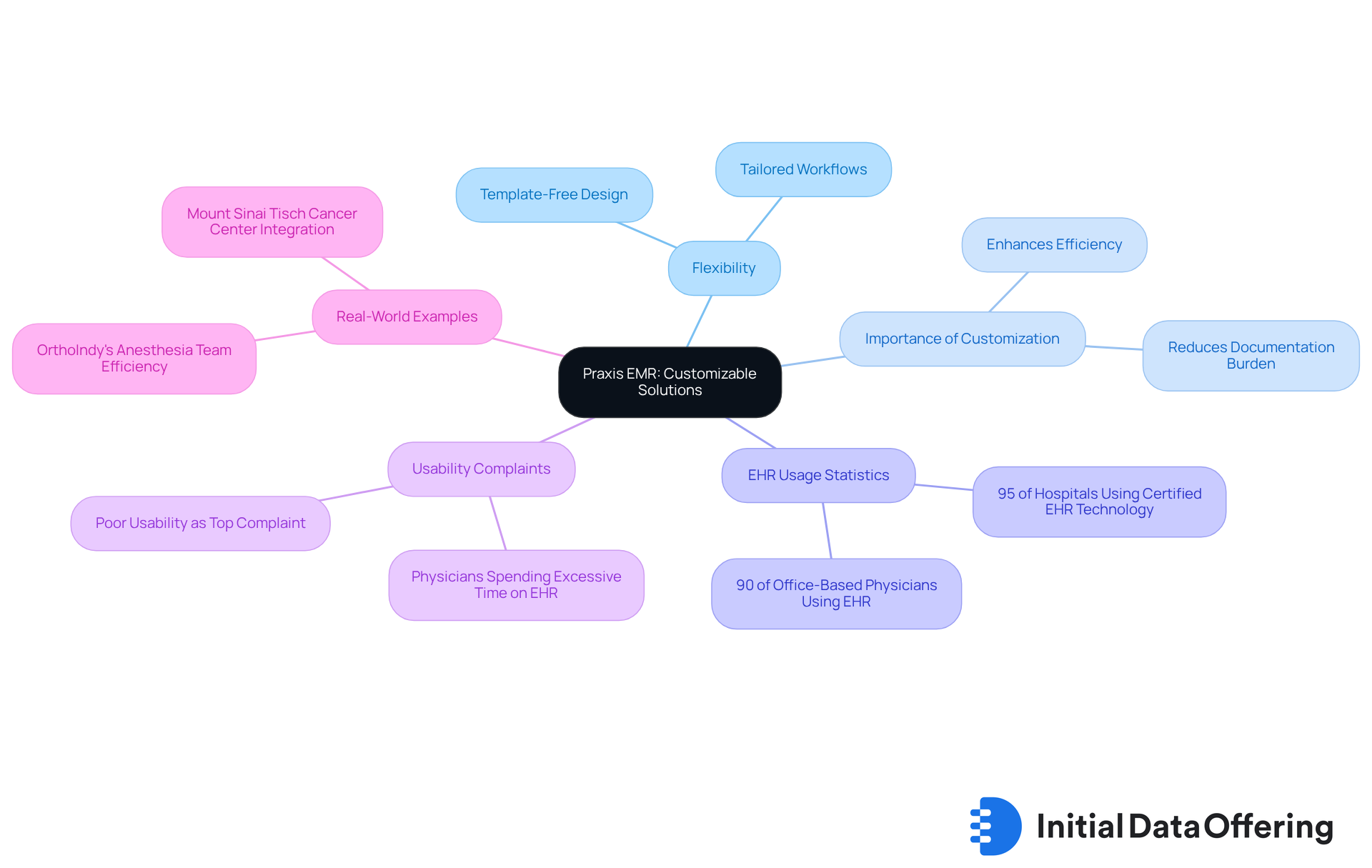
Cerner (Oracle): Robust Data Analytics and Interoperability Features
Cerner, now merged with Oracle, stands out due to its robust analytics and interoperability features, which are vital for contemporary medical systems. This platform facilitates seamless information exchange among various medical providers, significantly improving care coordination and enhancing patient outcomes. By 2025, the interoperability solutions market for medical services is projected to grow at a compound annual growth rate (CAGR) exceeding 13.89%, underscoring the increasing demand for effective information management solutions. Furthermore, the market is expected to reach approximately USD 14.47 billion by 2034, emphasizing the critical role of interoperability in healthcare services.
Cerner's advanced analytics tools empower healthcare organizations to derive actionable insights from their data, fostering informed decision-making and strategic planning. For instance, hospitals utilizing Cerner's interoperability capabilities have reported improved patient support through timely access to essential health information, which is crucial for effective treatment.
Healthcare leaders highlight the significance of interoperability in Electronic Health Record (EHR) systems, suggesting that it not only minimizes medical errors but also enhances the overall quality of care provided by EHR vendors. As Jonathan Bush, CEO of athenahealth, remarked, "The biggest problem with interoperability is, like many aspects of healthcare, the demand curve does not mitigate towards integration." This statement underscores the persistent challenges in achieving seamless information exchange.
Cerner's commitment to interoperability is evident in its integration features, which enable EHR vendors to facilitate the smooth exchange of patient information across diverse systems. This capability is increasingly important as medical providers rely on interconnected systems to deliver coordinated care. Regulatory frameworks such as HIPAA and GDPR further necessitate interoperability solutions, ensuring compliance and enhancing data security. The focus on interoperability within Cerner's platform positions it as a frontrunner in the evolving landscape of healthcare technology.
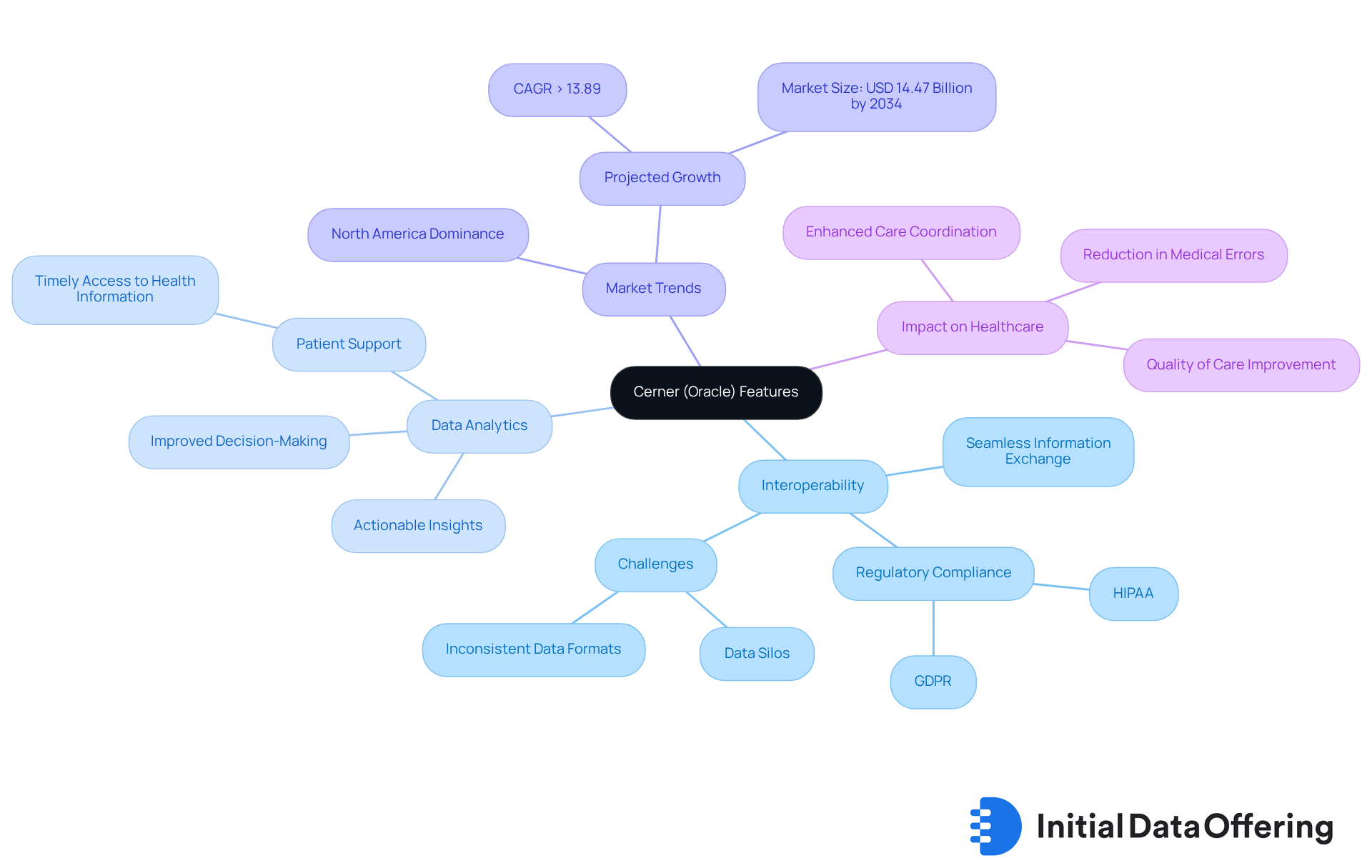
athenahealth: Cloud-Based Solutions with a Focus on Patient Engagement
athenahealth's cloud-based EHR solutions feature robust user engagement and accessibility tools. These include user-friendly portals, telehealth functionalities, and automated notifications. Such features significantly enhance the overall user experience. By prioritizing client involvement, athenahealth enables providers to forge stronger connections with their patients, which is crucial for improving health outcomes and satisfaction.
The advantages of these solutions are evident in the growing interest in telehealth services, with:
- 76% of individuals expressing interest
- 67% indicating they have utilized telemedicine
This trend underscores the increasing demand for flexible medical delivery options. Healthcare experts recognize the efficiency of EHR vendors offering cloud-based solutions in enhancing communication and improving service coordination. For example, Dr. Ronald Levine remarked that these solutions offer "24-hour access to our office," showcasing the practical benefits in patient-provider communication.
The benefits extend to practices using athenahealth's automated messaging, which have reported significant increases in appointment scheduling and adherence to care plans. Notably, 80% of individuals prefer digital communication channels for appointment reminders and follow-ups. This highlights the importance of digital engagement tools in enhancing user experiences. These real-world examples illustrate the transformative potential of cloud-based solutions in improving patient experiences and fostering loyalty within medical environments, particularly when utilized by EHR vendors.
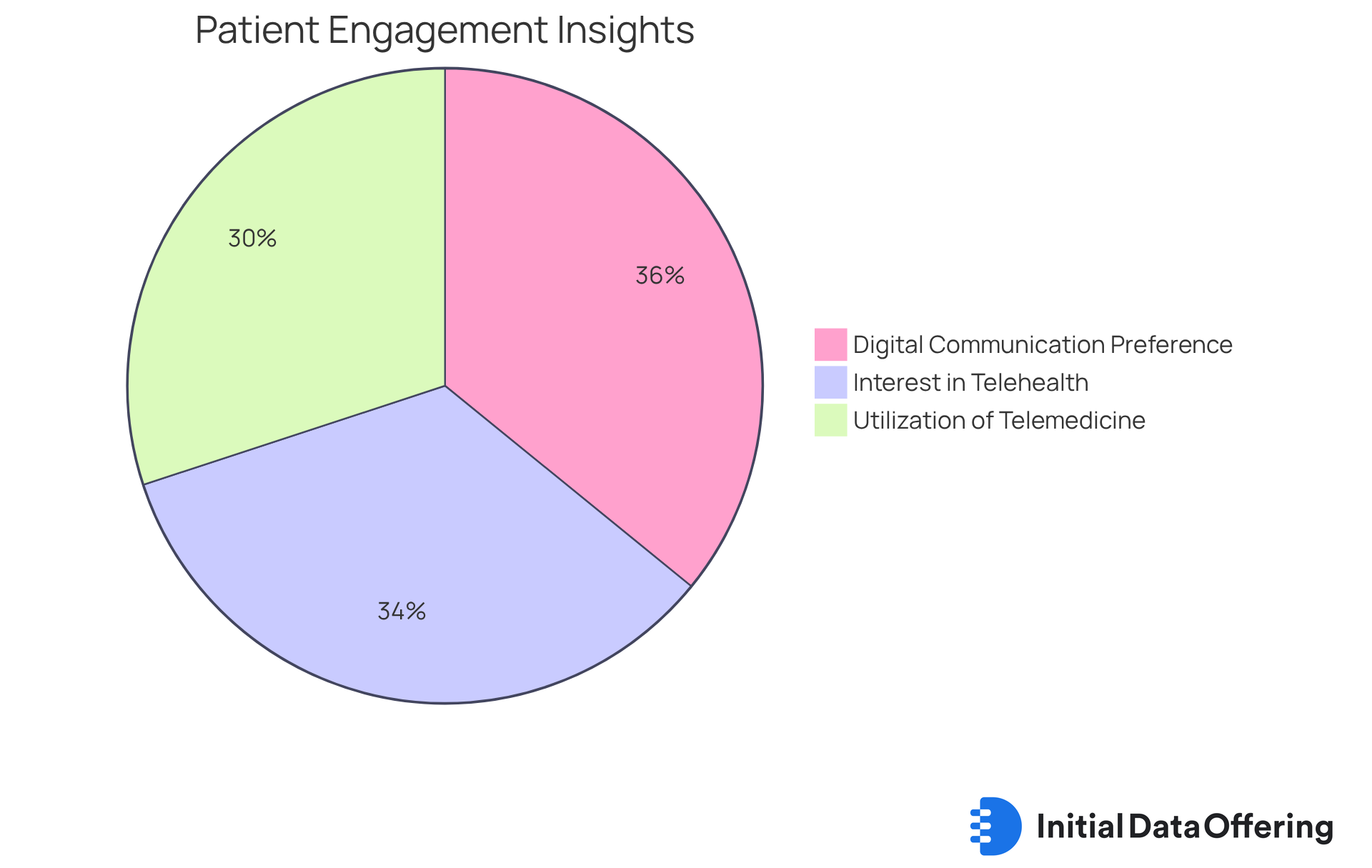
Meditech: User-Friendly EHR Solutions for Diverse Healthcare Settings
Meditech is one of the EHR vendors that provides user-friendly EHR solutions tailored for a wide range of medical environments, from small practices to large hospitals. One of its standout features is the intuitive interface, which simplifies the documentation process. This design allows medical professionals to focus more on client support rather than navigating complex software. The advantage here is clear: by enhancing usability, Meditech enables healthcare providers to manage client records efficiently, optimize workflows, and ultimately improve service delivery.
A recent survey of 3,000 hospital nurses highlighted Meditech among the top EHR vendors for nurse functionality and usability. This recognition underscores its effectiveness in addressing the usability challenges many medical professionals face. But what does this mean for healthcare outcomes? Meditech's solutions have been linked to significant improvements, including a reported:
- 30% increase in adherence to preventive health guidelines
- 48% reduction in medication errors
These statistics not only demonstrate the real-world effectiveness of Meditech's offerings but also illustrate how improved documentation efficiency can lead to greater satisfaction among users.
In conclusion, Meditech's commitment to usability and functionality not only enhances the daily operations of healthcare professionals but also contributes to better patient outcomes by collaborating with EHR vendors. How might these improvements impact your practice? By considering the benefits of adopting such solutions, healthcare providers can make informed decisions that enhance both their workflow and patient care.
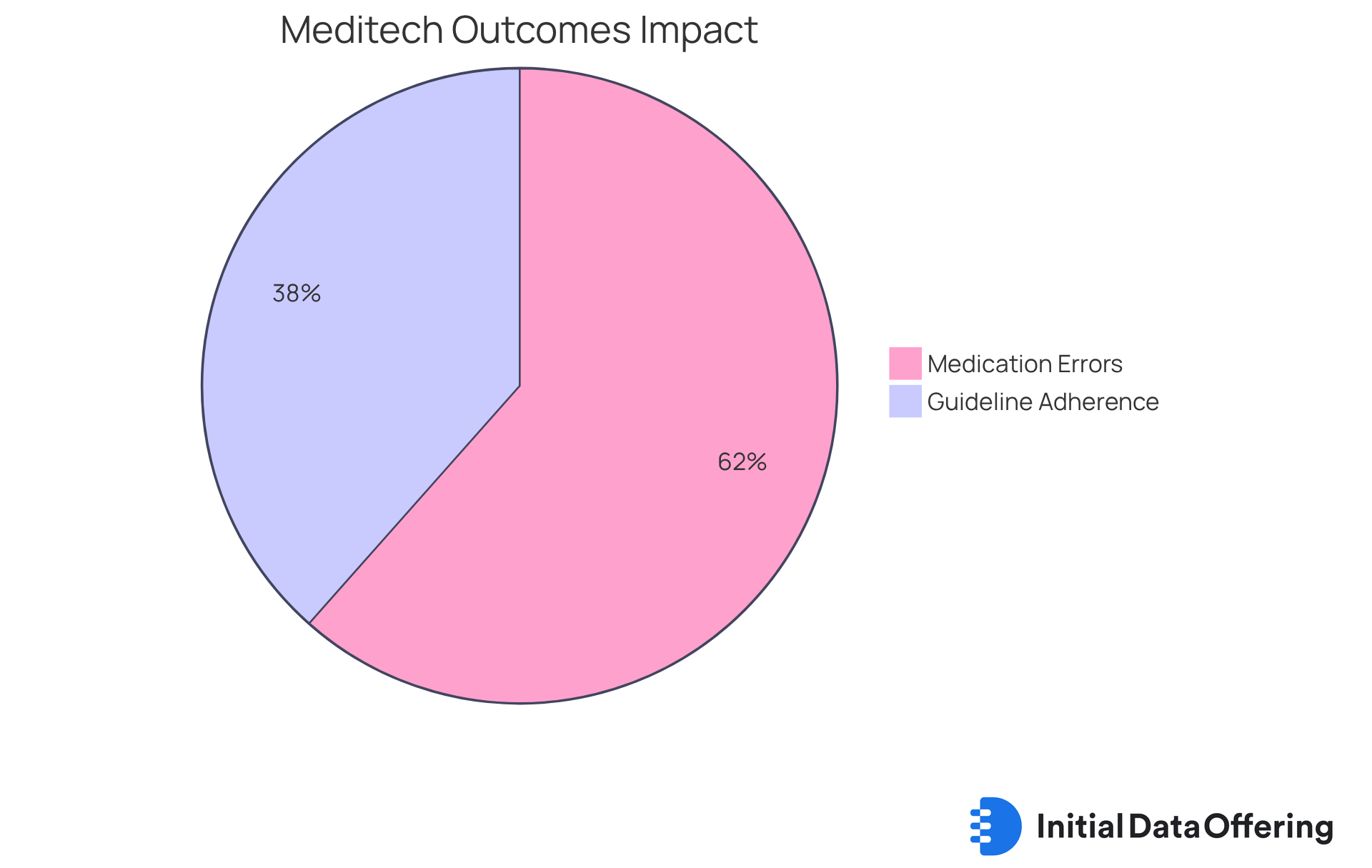
eClinicalWorks: Versatile EHR with Telehealth Capabilities
eClinicalWorks is a versatile EHR solution that integrates telehealth capabilities, making it an essential tool for modern medical providers. This platform enables virtual visits, allowing medical professionals to connect with individuals remotely, which significantly improves access to care. For instance, a recent survey indicated that:
- 44% of individuals had a virtual visit in the past year.
- 94% expressed a willingness to use telehealth again, primarily due to the convenience it offers.
Notably, telehealth visits among Medicare beneficiaries surged approximately 63-fold in 2020, underscoring the rapid adoption of these solutions. This flexibility enhances client engagement and assists medical providers in managing their workflows more efficiently. How can your practice leverage these advancements to improve patient care?
eClinicalWorks' commitment to innovation is evident in its advancements in AI-driven solutions and cloud computing, ensuring that it remains at the forefront of healthcare technology. As Girish Navani, CEO and cofounder of eClinicalWorks, stated, "eClinicalWorks aims to enhance health data sharing and offer individuals real-time access to their electronic medical information." This ultimately alters how support is provided and experienced.
The anticipated expansion of the telehealth market is significant, expected to approach nearly USD 591 billion by 2032 at a CAGR of 25.7%. This growth presents an opportunity for healthcare providers to adapt and thrive in a changing landscape.
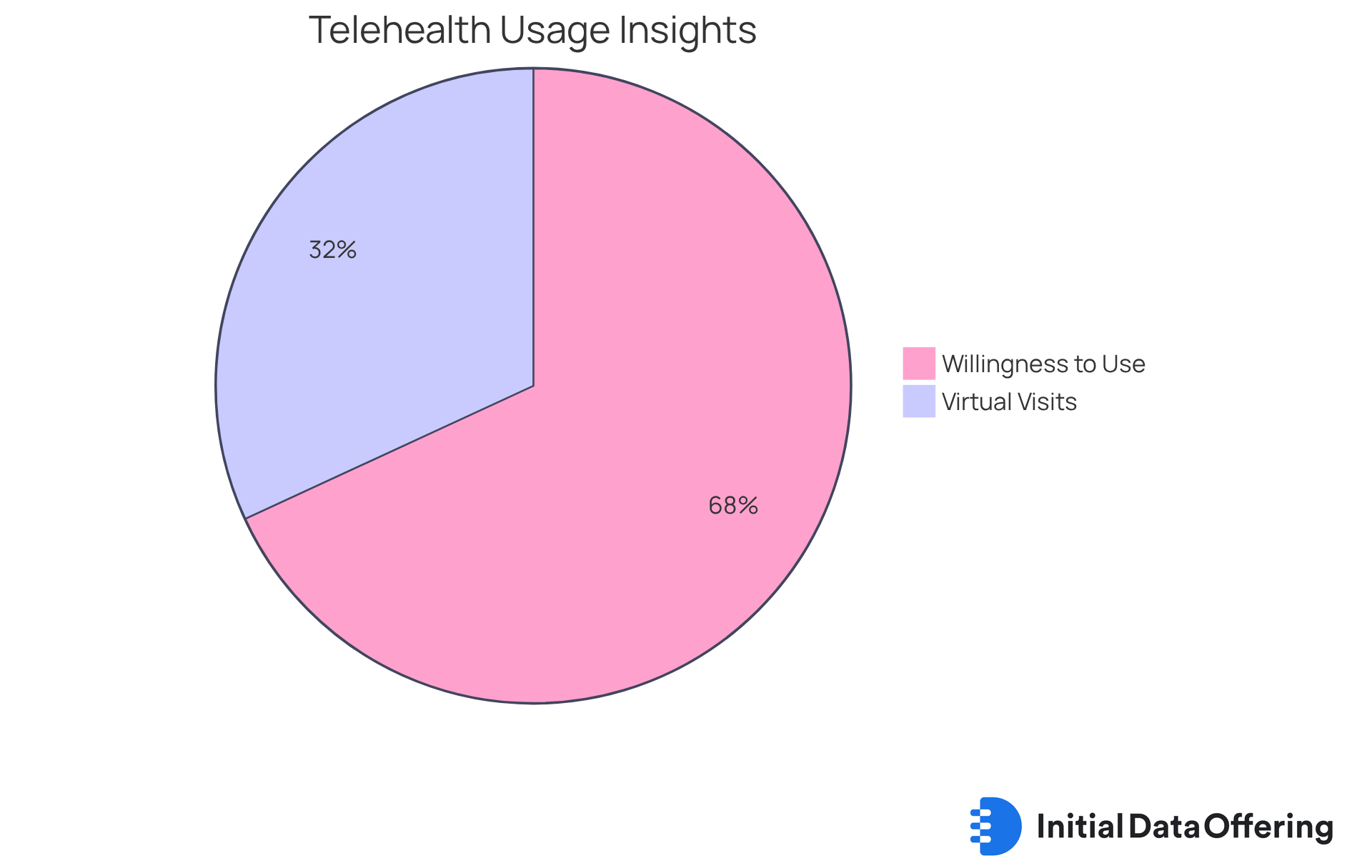
NextGen: Integrated Solutions for Clinical and Administrative Efficiency
NextGen Healthcare provides integrated EHR solutions that significantly boost both clinical and administrative efficiency. What if you could streamline your workflows and reduce administrative burdens? By combining client management, billing, and clinical documentation into a single platform, NextGen simplifies processes, allowing medical providers to concentrate on delivering high-quality care.
Practices using NextGen's EHR have reported increased user engagement through intuitive portals and a reduction in time spent on administrative tasks. In fact, 75% of Tebra’s survey participants indicated that EHRs take away time they could spend on providing superior support to patients. This highlights a crucial advantage of NextGen's platform: it not only enhances operational processes but also improves the overall patient experience.
Moreover, the integration of real-time eligibility verifications and seamless information sharing are essential features of NextGen's platform that enhance care coordination. These improvements showcase the platform's effectiveness in transforming service delivery. As medical administrators increasingly seek solutions that streamline operations, NextGen's commitment to innovation and user-friendly design positions it as a leader among EHR vendors in the market.
It's also important to note that 41% of providers cite staff training as a significant challenge with their current EHR systems. This statistic underscores the necessity of comprehensive support and training when adopting integrated solutions. By addressing these challenges, NextGen not only enhances its offerings but also empowers providers to maximize the benefits of their EHR systems.
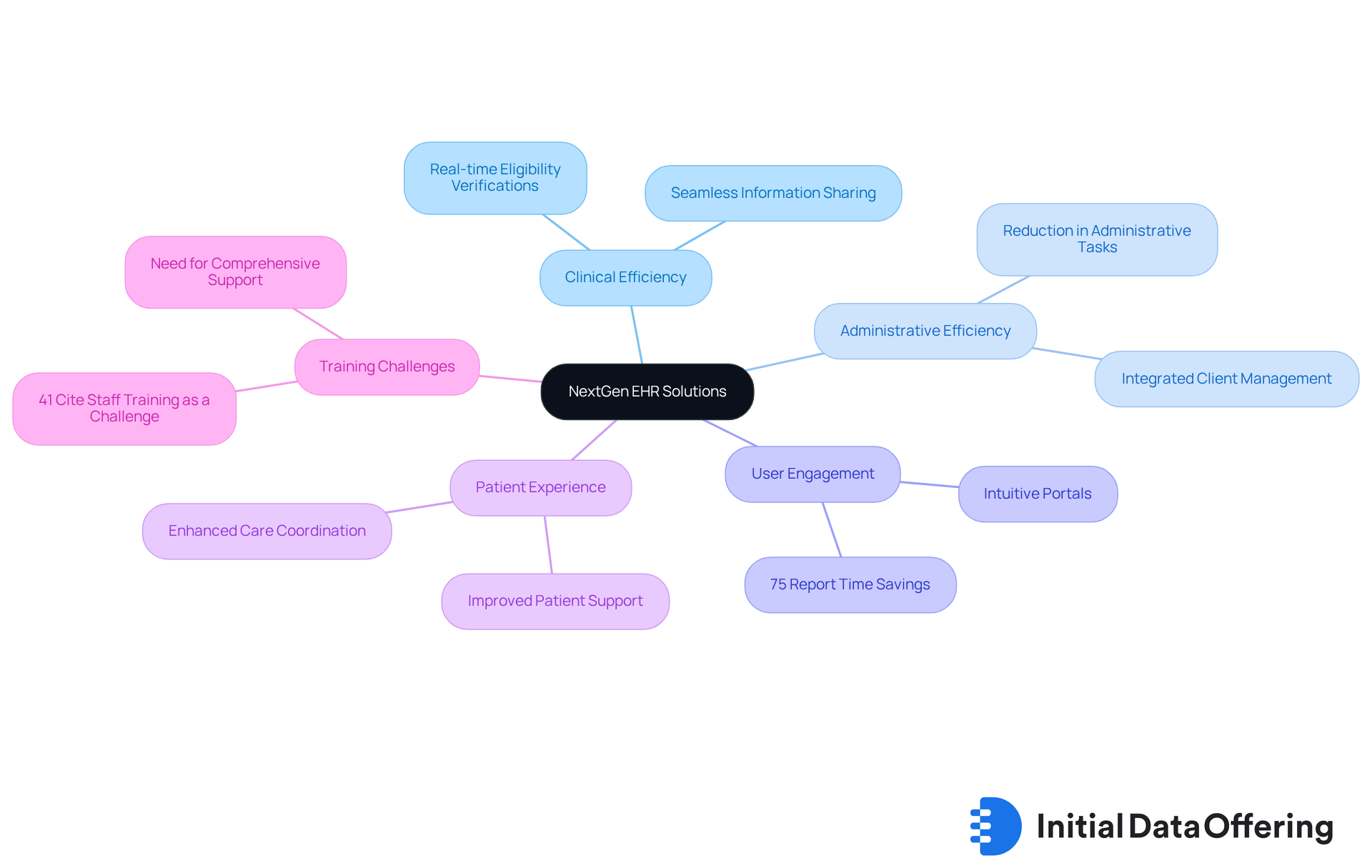
Allscripts: EHR Solutions Emphasizing Interoperability and Data Sharing
Allscripts provides EHR solutions that prioritize interoperability and information sharing, allowing medical providers to access and exchange client information seamlessly through EHR vendors. This platform integrates with various medical systems, which enhances coordination and leads to improved patient outcomes. By focusing on interoperability, Allscripts helps healthcare organizations break down data silos and fosters collaboration throughout the continuum of care.
With over 95% of hospitals in the U.S. adopting EHR systems, Allscripts stands out among EHR vendors by facilitating integration that is essential for enhancing care coordination. User satisfaction ratings reflect its effectiveness, with many providers noting significant improvements in workflow efficiency and client engagement. For instance, Mount Sinai Tisch Cancer Center has successfully integrated its EHR with clinical trial platforms, improving information accessibility for research purposes.
Healthcare leaders emphasize the importance of information exchange in achieving better healthcare outcomes. Tressa Springmann, Chief Information and Digital Officer at LifeBridge Health, points out that individuals increasingly influence medical decisions based on their comfort with technology, highlighting the need for robust digital solutions. Recent advancements in Allscripts' data sharing capabilities further solidify its position as a leader in transforming medical data management.
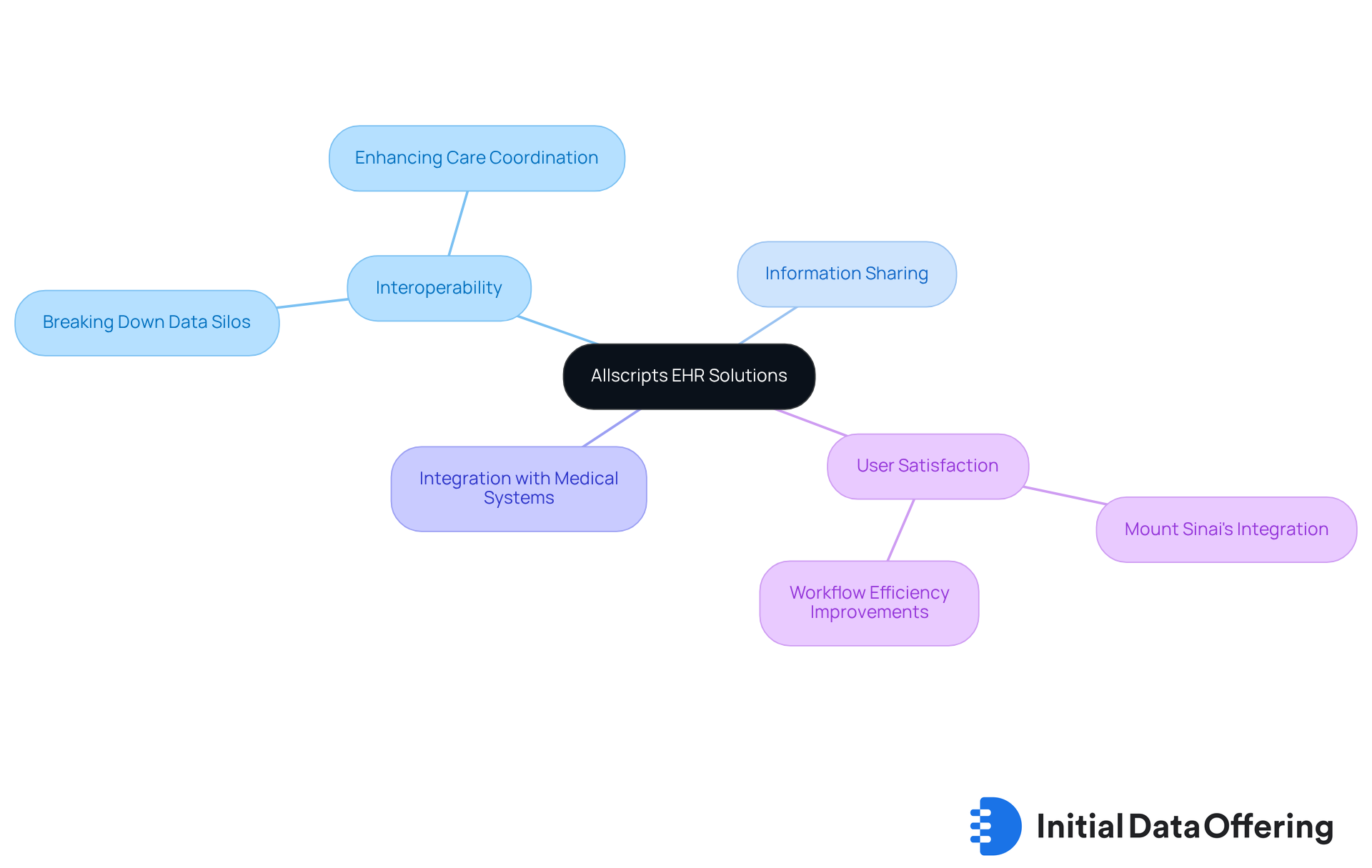
Practice Fusion: Accessible EHR Solutions for Smaller Practices
Practice Fusion offers a cloud-based EHR solution tailored for smaller healthcare practices. Its intuitive interface simplifies record management and optimizes workflow, making it a valuable tool for these providers. Key features include integrated billing and client engagement tools, which not only enhance operational efficiency but also elevate service quality.
In fact, 93% of users find Practice Fusion easy to use and navigate, while 75% recommend it based on 461 user reviews. This high level of user satisfaction reflects the platform's commitment to accessibility. By automating routine tasks like appointment scheduling and billing, Practice Fusion reduces administrative burdens, allowing smaller practices to focus more on patient care rather than navigating complex systems.
Moreover, the integration with billing systems ensures accurate claims processing, further boosting operational efficiency. This approach not only improves patient outcomes but also fosters a more efficient healthcare environment. For providers with limited resources, Practice Fusion stands out as an attractive choice.
As the U.S. EHR vendors project the market to reach USD 12.87 billion in 2024, it is becoming increasingly crucial for smaller practices to adopt such systems. How can your practice leverage these advancements to enhance care delivery?
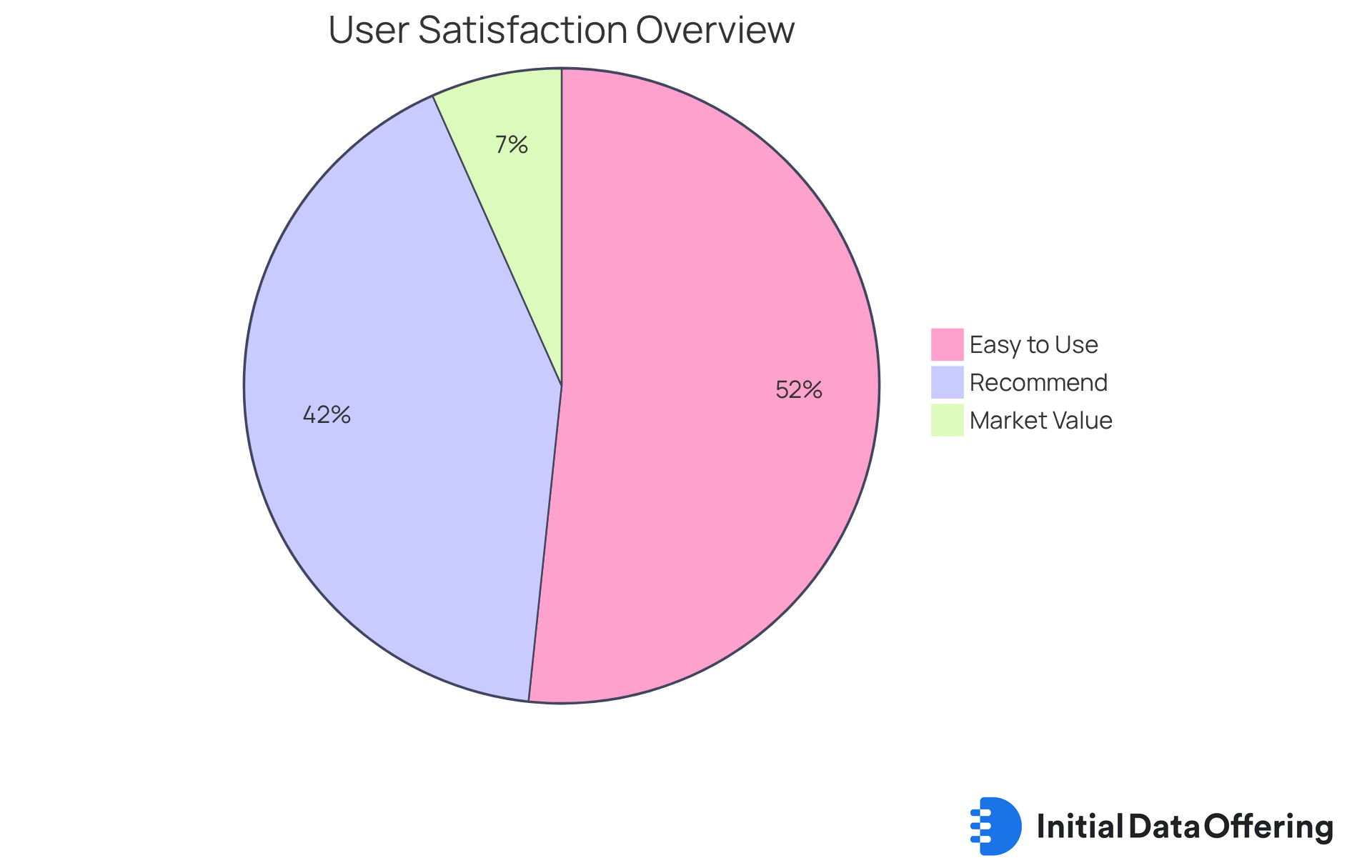
Conclusion
The evolving landscape of healthcare data management is significantly influenced by a variety of Electronic Health Record (EHR) vendors, each providing unique solutions tailored to the diverse needs of medical providers. This article highlights how vendors like Epic, Cerner, and athenahealth are not only enhancing operational efficiency but also improving patient outcomes through innovative approaches such as interoperability, user engagement, and customizable platforms. The central theme emphasizes the critical role of effective data management in transforming healthcare delivery and ensuring better health outcomes.
Key insights from the discussion reveal that platforms like Epic and Cerner lead the charge with their comprehensive analytics and interoperability features. These capabilities facilitate seamless information sharing across various healthcare environments, which is essential for coordinated care. Meanwhile, Praxis EMR and Practice Fusion showcase the importance of customizable and user-friendly solutions, empowering providers to tailor their workflows to meet specific practice needs. Furthermore, the rise of telehealth capabilities through eClinicalWorks and athenahealth reflects the growing demand for flexible healthcare delivery options, aligning with patient preferences for accessibility and convenience.
As healthcare continues to advance, the significance of adopting robust EHR solutions cannot be overstated. Organizations must leverage these technologies to enhance care coordination, improve patient engagement, and ultimately drive better health outcomes. The time to act is now. By embracing the innovations offered by these EHR vendors, healthcare providers can position themselves at the forefront of a data-driven future, ensuring they meet the evolving demands of the industry and the patients they serve.
Frequently Asked Questions
What is an Initial Data Offering (IDO)?
An Initial Data Offering (IDO) is a platform designed to streamline the launch and discovery of new datasets, particularly in the medical field, by curating high-quality and distinctive datasets.
How does IDO benefit the medical field?
IDO addresses the fragmented nature of the information marketplace, improving accessibility to information which can lead to better patient outcomes and advancements in healthcare practices.
What statistics highlight the demand for diverse datasets?
Statistics reveal that 62% of surveyed clients utilized alternative information last year, indicating an increasing demand for diverse datasets.
Why is information accessibility important in healthcare?
Accessible and reliable information is crucial for informed decision-making, maximizing the potential of medical data, and overcoming industry challenges related to information accessibility.
What are some successful examples of data sharing in healthcare?
Successful examples include Syndesis Health's collaborations that aim to improve access to real-world information, demonstrating the positive impact of enhanced sharing on healthcare outcomes.
What trends are expected in the digital health landscape by 2025?
Trends suggest a sustained emphasis on marketplace solutions that prioritize accessibility and quality, with platforms like IDO playing a pivotal role in connecting information providers with users.
What is Epic EHR known for?
Epic EHR is recognized as a leader in medical information management, known for its comprehensive solutions that enhance patient outcomes and its significant market share in the U.S. hospital EHR sector.
How does Epic EHR improve service coordination?
Epic integrates clinical, administrative, and financial information into a unified platform, allowing providers to access and analyze patient information seamlessly.
What benefits do advanced analytics capabilities of Epic provide?
The advanced analytics capabilities empower medical organizations to derive actionable insights from their data, leading to improved decision-making and treatment outcomes.
How does Epic EHR ensure interoperability?
Epic's interoperability features facilitate the transfer of patient information across diverse medical settings, essential for comprehensive patient management and compliance with regulatory requirements.
What improvements have hospitals reported using Epic EHR?
Hospitals utilizing Epic EHR have reported notable improvements in care quality and patient satisfaction.
What is Praxis EMR?
Praxis EMR offers a customizable platform that allows medical providers to tailor their electronic health records to meet specific practice needs, enhancing efficiency and reducing documentation burden.
Why is flexibility important in EHR systems?
Flexibility allows providers to create workflows that align with their clinical processes, enabling them to focus on delivering high-quality care without the constraints of rigid systems.
What does the study published in JAMA reveal about EHR usability?
The study highlights that poor usability of EHR systems is the number one complaint of most medical professionals, underscoring the need for adaptable solutions.
Can you provide an example of a customizable EHR improving healthcare delivery?
The real-time information integration project at Mount Sinai Tisch Cancer Center exemplifies how customizable EHR systems can enhance individual treatment and operational efficiency.